Current Research Themes
Computation on Encrypted Data
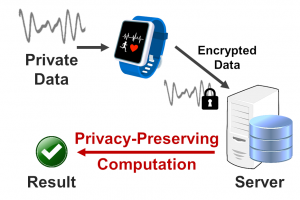
Secure privacy-preserving computation involves performing complex operations such as machine learning, image processing and database management on encrypted data. This is achieved using cryptographic tools such as homomorphic encryption, functional encryption, secure multi-party computation and secret sharing. Our objectives in this direction include high-performance FPGA-based acceleration for cloud, energy-efficient ASIC for edge devices and demonstration of new applications.
Related Publications: CICC 2021, SSCL 2021, ANTS 2022, GLOBECOM 2023, CiC 2025
Quantum-Secure Cryptography
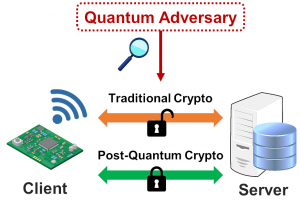
Modern public key cryptography protocols are at the risk of being rendered insecure by future large-scale quantum computers. Post-quantum cryptography aims to solve this challenge using several new algorithms based on cryptographic primitives such as lattices, supersingular elliptic curve isogenies, error correction codes, hash functions, multivariate equations and zero knowledge proofs. Our objectives in this direction include hardware accelerator design, optimized software implementation and hardware-software co-design.
Related Publications: ISSCC 2019, TCHES 2019, ISCAS 2020, ICC 2020, ICCD 2022, SSCMag 2023, ISCC 2024, ICASSP 2025, HiPCW 2025, VLSID 2026, ISSCC 2026
Efficient Encryption and Authentication
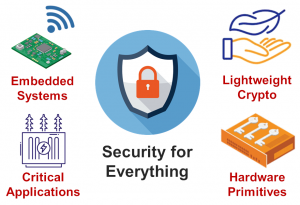
Traditional encryption and authentication protocols are often too expensive for ultra-low-power systems and time-critical systems such as RFID tags, smart cards, biomedical devices and industrial embedded systems, which are severely constrained not only in terms of logic area and power but also on-chip memory and computational resources. Our objectives in this direction include implementation of light-weight cryptography and co-design of protocols with efficient circuit primitives.
Related Publications: GLOBECOM 2017, ISSCC 2018, JSSC 2019, CICC 2020, SSCMag 2020, CBMS 2021, CICC 2022, OJSSCS 2023, CICC 2023, iSES 2023, JSSC 2024, HPEC 2024, FNWF 2025, ICEdge 2025
Secure Machine Learning
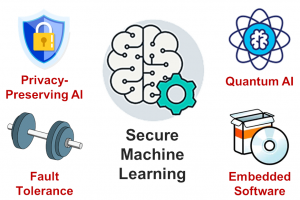
Recent advancements in machine learning theory has enabled various signal processing applications using artificial neural networks. However, their computational complexity, adversarial fault tolerance and privacy concerns have inspired various new hardware and software architectures. Our objectives in this direction include secure, efficient and robust machine learning implementation and privacy-preserving machine learning.
Related Publications: IoTJ 2021, ISSCC 2022, JSSC 2023, GLOBECOM 2023, CiC 2025, ICEdge 2025
Emerging Compute Paradigms
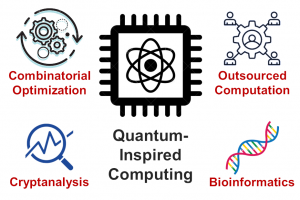
The rise of cloud-based quantum computing has motivated new research directions such as quantum cryptanalysis, quantum-enhanced machine learning, outsourced computation, hybrid quantum-classical algorithms, quantum-inspired computing and other emerging compute paradigms. Our objectives in this direction include design of quantum circuits, analysis of quantum-classical hybrid algorithms, and implementation of quantum-inspired hardware architectures.
Related Publications: ICCD 2022, HPEC 2023, TCAD 2024, HPEC 2024, HiPCW 2025, VLSID 2026
